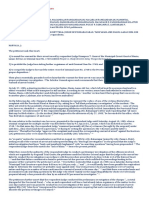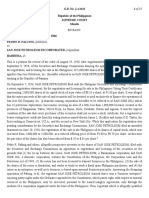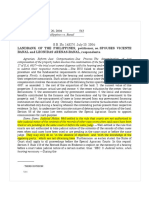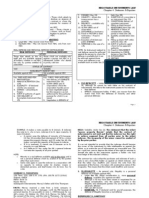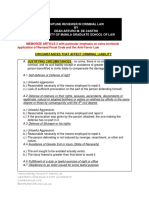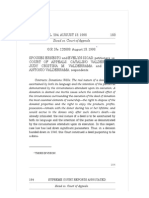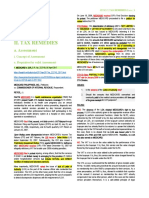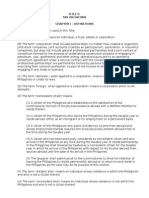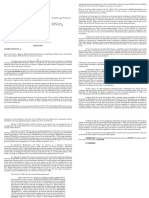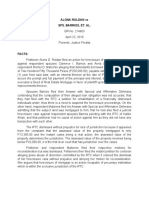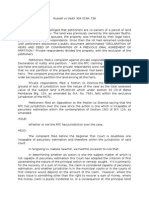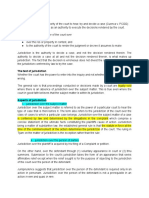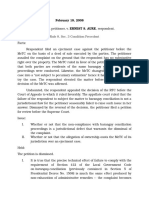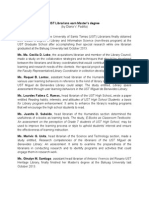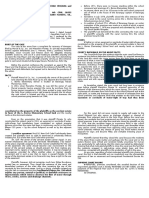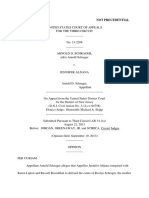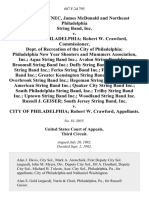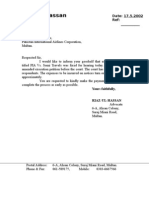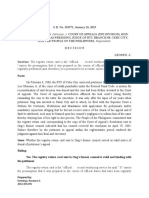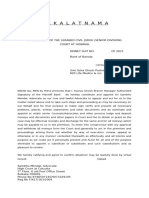0 ratings0% found this document useful (0 votes)
212 viewsCivPro Dean Riano
CivPro Dean Riano
Uploaded by
Alexis Ailex Villamor Jr.The RTC has jurisdiction over a case filed by petitioners seeking to nullify a document executed by respondents that partitioned property and excluded petitioners as legal heirs. While the monetary value of the property is low, the primary purpose of the case is not monetary recovery but rather the declaration of nullity, making it a case incapable of pecuniary estimation and within the jurisdiction of the RTC. A petition for relief from judgment is also not the proper remedy when other legal remedies like appeal were available but not pursued due to negligence.
Copyright:
© All Rights Reserved
Available Formats
Download as PDF, TXT or read online from Scribd
CivPro Dean Riano
CivPro Dean Riano
Uploaded by
Alexis Ailex Villamor Jr.0 ratings0% found this document useful (0 votes)
212 views21 pagesThe RTC has jurisdiction over a case filed by petitioners seeking to nullify a document executed by respondents that partitioned property and excluded petitioners as legal heirs. While the monetary value of the property is low, the primary purpose of the case is not monetary recovery but rather the declaration of nullity, making it a case incapable of pecuniary estimation and within the jurisdiction of the RTC. A petition for relief from judgment is also not the proper remedy when other legal remedies like appeal were available but not pursued due to negligence.
Original Description:
Assigned cases
Copyright
© © All Rights Reserved
Available Formats
PDF, TXT or read online from Scribd
Share this document
Did you find this document useful?
Is this content inappropriate?
The RTC has jurisdiction over a case filed by petitioners seeking to nullify a document executed by respondents that partitioned property and excluded petitioners as legal heirs. While the monetary value of the property is low, the primary purpose of the case is not monetary recovery but rather the declaration of nullity, making it a case incapable of pecuniary estimation and within the jurisdiction of the RTC. A petition for relief from judgment is also not the proper remedy when other legal remedies like appeal were available but not pursued due to negligence.
Copyright:
© All Rights Reserved
Available Formats
Download as PDF, TXT or read online from Scribd
Download as pdf or txt
0 ratings0% found this document useful (0 votes)
212 views21 pagesCivPro Dean Riano
CivPro Dean Riano
Uploaded by
Alexis Ailex Villamor Jr.The RTC has jurisdiction over a case filed by petitioners seeking to nullify a document executed by respondents that partitioned property and excluded petitioners as legal heirs. While the monetary value of the property is low, the primary purpose of the case is not monetary recovery but rather the declaration of nullity, making it a case incapable of pecuniary estimation and within the jurisdiction of the RTC. A petition for relief from judgment is also not the proper remedy when other legal remedies like appeal were available but not pursued due to negligence.
Copyright:
© All Rights Reserved
Available Formats
Download as PDF, TXT or read online from Scribd
Download as pdf or txt
You are on page 1of 21
Russel vs. Vestil, 304 SCRA 738; GR No.
119347, March 17, 1999
(Civil Procedures Jurisdiction; Civil actions in which the subject of the litigation
is incapable of pecuniary estimation)
Facts: Petitioners discovered a public document, which is a declaration of heirs
and deed of confirmation of a previous oral agreement, of partition, affecting the
land executed by and among the respondents whereby respondents divided the
property among themselves to the exclusion of petitioners who are entitled
thereto as legal heirs also.
Petitioners filed a complaint, denominated DECLARATION OF NULLITY AND
PARTITION against defendants with the RTC claiming that the document was
false and perjurious as the private respondents were not the only heirs and that
no oral partition of the property whatsoever had been made between the heirs.
The complaint prayed that the document be declared null and void and an order
be issued to partition the land among all the heirs.
Private respondents filed a Motion to Dismiss the complaint on the ground of lack
of jurisdiction over the nature of the case as the total assessed value of the
subject land is P5,000.00 which under section 33 (3) of Batas Pambansa Blg.
129, as amended by R.A. No. 7691, falls within the exclusive jurisdiction of the
MTC.
Petitioners filed an Opposition to the Motion to Dismiss saying that the RTC has
jurisdiction over the case since the action is one which is incapable of pecuniary
estimation within the contemplation of Section 19(l) of B.P. 129, as amended.
Issue: WON the RTC has jurisdiction over the nature of the civil case.
Held: Yes. The complaint filed before the Regional Trial Court is one incapable of
pecuniary estimation and therefore within the jurisdiction of said court.
In Singsong vs. Isabela Sawmill, the Supreme Court ruled that:
In determining whether an action is one the subject matter of which is not
capable of pecuniary estimation this Court has adopted the criterion of first
ascertaining the nature of the principal action or remedy sought. If it is primarily
for the recovery of a sum of money, the claim is considered capable of pecuniary
estimation, and whether jurisdiction is in the municipal courts or in the courts of
first instance would depend on the amount of the claim. However, where the
basic issue is something other than the right to recover a sum of money, where
the money claim is purely incidental to, or a consequence of, the principal relief
sought, this Court has considered such actions as cases where the subject of the
litigation may not be estimated in terms of money, and are cognizable exclusively
by courts of first instance (now Regional Trial Courts).
The main purpose of petitioners in filing the complaint is to declare null and void
the document in question. While the complaint also prays for the partition of the
property, this is just incidental to the main action, which is the declaration of
nullity of the document above-described. It is axiomatic that jurisdiction over the
subject matter of a case is conferred by law and is determined by the allegations
in the complaint and the character of the relief sought, irrespective of whether the
plaintiff is entitled to all or some of the claims asserted therein.
Gomez v Montalban (G.R. No. 174414)
When a party has another remedy available to him, which may be either a motion
for new trial or appeal from an adverse decision of the trial court, and he was not
prevented by fraud, accident, mistake or excusable negligence from filing such
motion or taking such appeal, he cannot avail himself of this petition.
Facts:
Lita Montalban obtained a loan from Elmer Gomez in the amount of P40,000 with
a voluntary proposal on her part to pay 15% interest per month. Montalban failed
to comply with her obligation so Gomez filed a complaint in the RTC for sum of
money. Summons was served but despite her receipt, she still failed to file an
Answer. She was declared in default and upon motion, Gomez was allowed to
present evidence ex parte. The RTC rendered a decision ordering Montalban to
pay Gomez.
Thereafter, respondent filed a Petition for Relief from Judgment alleging that
there was no proper service of summons since there was no personal service.
She alleged that one Mrs. Alicia Dela Torre was not authorized to receive
summons and that her failure to file an Answer was due to fraud, accident,
mistake, excusable negligence (FAME). The Petition was set for hearing but
counsel for respondent failed to appear before the court hence the dismissal of
the Petition.
Montalban filed for a Motion for Reconsideration of the dismissal of the Petition
stating that counsels failure to appeal was unintentional to which the RTC
granted. To this instance, Gomez filed a Petition for Reconsideration.
Issue:
Whether or not the granting of Petition for Relief from Judgment by the RTC is
proper.
Held:
NO. The RTC committed an error in doing so. A Petition for Relief under Rule 38
is only available against a final and executory judgment and the grounds include
fraud, accident, mistake or excusable negligence.
Discussion on Grounds:
"Mistake" refers to mistake of fact, not of law, which relates to the case. The word
"mistake," which grants relief from judgment, does not apply and was never
intended to apply to a judicial error which the court might have committed in the
trial. Such errors may be corrected by means of an appeal. This does not exist in
the case at bar, because respondent has in no wise been prevented from
interposing an appeal.
"Fraud," on the other hand, must be extrinsic or collateral, that is, the kind which
prevented the aggrieved party from having a trial or presenting his case to the
court,or was used to procure the judgment without fair submission of the
controversy. This is not present in the case at hand as respondent was not
prevented from securing a fair trial and was given the opportunity to present her
case.
Negligence to be excusable must be one which ordinary diligence and prudence
could not have guarded against. Under Section 1 Rule 38, the "negligence" must
be excusable and generally imputable to the party because if it is imputable to
the counsel, it is binding on the client. To follow a contrary rule and allow a party
to disown his counsel's conduct would render proceedings indefinite, tentative,
and subject to reopening by the mere subterfuge of replacing counsel. What the
aggrieved litigant should do is seek administrative sanctions against the erring
counsel and not ask for the reversal of the court's ruling.
In Tuason v CA, the court explained the nature of a Petition for Relief from
Judgment:
A petition for relief from judgment is an equitable remedy that is allowed only in
exceptional cases where there is no other available or adequate remedy. When a
party has another remedy available to him, which may be either a motion for new
trial or appeal from an adverse decision of the trial court, and he was not
prevented by fraud, accident, mistake or excusable negligence from filing such
motion or taking such appeal, he cannot avail himself of this petition. Indeed,
relief will not be granted to a party who seeks avoidance from the effects of the
judgment when the loss of the remedy at law was due to his own negligence;
otherwise the petition for relief can be used to revive the right to appeal which
had been lost thru inexcusable negligence.
In the case, Montalban contended that judgment was entered against her
through mistake or fraud because she was not duly served summons. However,
under the discussion of the following grounds, the SC sees no merit in her
petition.
*Petition for Relief from Judgment is set aside.
Quinagoran v CA
Facts:
The heirs of Juan dela Cruz, represented by Senen dela Cruz filed a Complaint
for Recovery of Portion of Registered Land with Compensation and Damages
against Victorino Quinagoran before the RTC Cagayan. They alleged that they
are the co-owners of a a parcel of land at Centro, Piat, Cagayan, which they
inherited from the late Juan dela Cruz.
Quinagoran started occupying a house on the north-west portion of the property,
by tolerance of the heirs. The heirs asked petitioner to remove the house as they
planned to construct a commercial building on the property but petitioner refused,
claiming ownership over the lot.
The heirs prayed for the reconveyance and surrender of the disputed lot and to
be paid the amount of P5,000.00 monthly until the property is vacated.
Quinagoran filed a Motion to Dismiss claiming that the RTC has no jurisdiction
over the case under Republic Act (R.A.) No. 7691, which expanded the exclusive
original jurisdiction of the Municipal Trial Court (MTC) to include all civil actions
which involve title to, or possession of, real property, or any interest therein which
does not exceed P20,000.00. He argued that since the lot which he owns
adjacent to the contested property has an assessed value of P1,730, the
assessed value of the lot under controversy would not be more than the said
amount. He likewise avers that it is an indispensable requirement that the
complaint should allege the assessed value of the property involved.
The heirs maintain that the contention of petitioner in his Motion to Dismiss
before the RTC that the assessed value of the disputed lot is below P20,000.00
is based on the assessed value of an adjacent property and no documentary
proof was shown to support the said allegation. It also contended that the tax
declaration which petitioner presented, together with his Supplemental Reply
before the CA, and on the basis of which he claims that the disputed property's
assessed value is only P551.00, should also not be given credence as the said
tax declaration reflects the amount of P56,100.or the entire property.
The RTC denied petitioner's Motion to Dismiss on the basis that the action is
accion publicciana and therefore, its jurisdiction lies in the RTC, regardless of the
value of the property. The CA affirmed decision of the RTC.
Issue:
Whether or not the RTC has jurisdiction over all cases of recovery of possession
regardless of the value of the property involved?
Held:
NO. Jurisdiction lies in the MTC.
The doctrine that all cases of recovery of possession or accion publiciana lies
with the RTC regardless of the value of the property -- no longer holds true. As
things now stand, a distinction must be made between those properties the
assessed value of which is below P20,000.00, if outside Metro Manila; and
P50,000.00, if within.
Republic Act No. 7691 expressly provides:
SEC. 19. Jurisdiction in civil cases Regional Trial Courts shall exercise
exclusive original jurisdiction:
(2) In all civil actions which involve the title to or possession of, real property, or
any interest therein, where the assessed value of the property involved exceeds
Twenty thousand pesos (P20,000.00) or, for civil actions in Metro Manila, where
such value exceeds Fifty thousand pesos (P50,000.00) except for forcible entry
into and unlawful detainer of lands or buildings, original jurisdiction over which is
conferred upon the Metropolitan Trial Courts, Municipal Trial Courts, and
Municipal Circuit Trial Courts.
In Atuel v. Valdez, the Court likewise expressly stated that:
Jurisdiction over an accion publiciana is vested in a court of general
jurisdiction. Specifically, the regional trial court exercises exclusive original
jurisdiction in all civil actions which involve x x x possession of real property.
However, if the assessed value of the real property involved does not exceed
P50,000.00 in Metro Manila, and P20,000.00 outside of Metro Manila, the
municipal trial court exercises jurisdiction over actions to recover possession of
real property.
In the case, Quinagoran maintains that there should be such an allegation
of the assessed value of the real property to determine jurisdiction. However,
nowhere in said complaint was the assessed value of the subject property ever
mentioned. There is therefore no showing on the face of the complaint that the
RTC has exclusive jurisdiction over the action of the respondents. Absent any
allegation in the complaint of the assessed value of the property, it cannot be
determined whether the RTC or the MTC has original and exclusive jurisdiction
over the petitioner's action. The courts cannot take judicial notice of the assessed
or market value of the land.
Considering that the respondents failed to allege in their complaint the
assessed value of the subject property, the RTC seriously erred in denying the
motion to dismiss. Consequently, all proceedings in the RTC are null and void.
The CA also erred in affirming the RTC.
HEIRS OF VALERIANO CONCHA vs. SPOUSES GREGORIO LUMOCSO G.R.
No. 158121 December 12, 2007 450 SCRA 1
PUNO, J.: Facts:
This is an appeal by certiorari under Rule 45 of the Rules of Court on the
decision and resolution of the Court of Appeals, annulling the resolutions and
order of the Regional Trial Court of Dipolog City, Branch 9, in a civil case wherein
petitioners filed for a complaint for Reconveyance and/or Annulment of Title with
Damages against respondents, seeking to annul Free Patent No. (IX- 8)985 and
the corresponding Original Certificate of Title (OCT) No. P-22556 issued in the
name of "Gregorio Lumocso" covering a certain parcel of land.
Respondents moved for the dismissal of the respective cases against them on
the same grounds of: (a) lack of jurisdiction of the RTC over the subject matters
of the complaints; (b) failure to state
causes of action for reconveyance; (c) prescription; and (d) waiver,
abandonment, laches and estoppel. On the issue of jurisdiction, respondents
contended that the RTC has no jurisdiction over the complaints pursuant to
Section 19(2) of Batas Pambansa Blg. (B.P.) 129, as amended by R.A. No. 7691,
as in each case, the assessed values of the subject lots are less than
P20,000.00. Petitioners opposed, contending that the instant cases involve
actions the subject matters of which are incapable of pecuniary estimation which,
under Section 19(1) of B.P. 129, as amended by R.A. 7691, fall within the
exclusive original jurisdiction of the RTCs. They also contended that they have
two main causes of action: for reconveyance and for recovery of the value of the
trees felled by respondents. Hence, the totality of the claims must be considered
which, if computed, allegedly falls within the exclusive original jurisdiction of the
RTC.
Issue:
Whether or not the RTC has no jurisdiction over the complaints pursuant to
Section 19(2) of Batas Pambansa Blg. (B.P.) 129, as amended by R.A. No. 7691,
as in each case, the assessed values of the subject lots are less than
P20,000.00
Held:
Jurisdiction over the subject matter is the power to hear and determine cases of
the general class to which the proceedings in question belong. It is conferred by
law and an objection based on this ground cannot be waived by the parties. To
determine whether a court has jurisdiction over the subject matter of a case, it is
important to determine the nature of the cause of action and of the relief sought.
The trial court correctly held that the instant cases involve actions for
reconveyance. An action for reconveyance respects the decree of registration as
incontrovertible but seeks the transfer of property, which has been wrongfully or
erroneously registered in other persons' names, to its rightful and legal owners,
or to those who claim to have a better right. There is no special ground for an
action for reconveyance. It is enough that the aggrieved party has a legal claim
on the property superior to that of the registered owner and that the property has
not yet passed to the hands of an innocent purchaser for value.
Being in the nature of actions for reconveyance or actions to remove cloud on
one's title, the applicable law to determine which court has jurisdiction is Section
19(2) of B.P. 129, as amended by R.A. No. 7691, viz:
Section 19. Jurisdiction in Civil Cases.-- Regional Trial Courts shall exercise
exclusive original jurisdiction:
(2) In all civil actions which involve the title to, or possession of, real property, or
any interest therein, where the assessed value of the property involved exceeds
Twenty thousand pesos (P20,000.00) or for civil actions in Metro Manila, where
such value exceeds Fifty thousand pesos (P50,000.00) except actions for forcible
entry into and unlawful detainer of lands or buildings, original jurisdiction over
which is conferred upon the Metropolitan Trial Courts, Municipal Trial Courts, and
Municipal Circuit Trial Courts; In the cases at bar, it is undisputed that the
subject lots are situated in Cogon, Dipolog City and
their assessed values are less than P20,000.00. Hence, the MTC clearly has
jurisdiction. Petitioners' contention that this case is one that is incapable of
pecuniary estimation under the exclusive original jurisdiction of the RTC pursuant
to Section 19(1) of B.P. 129 is erroneous.
Republic of the Philippines
SUPREME COURT
Manila
THIRD DIVISION
G.R. No. 164560 July 22, 2009
ANA DE GUIA SAN PEDRO and ALEJO DOPEO, Petitioners,
vs.
HON. FATIMA G. ASDALA, in her capacity as the Presiding Judge of the
Regional Trial Court of Quezon City, Branch 87; HON. MANUEL TARO, in
his capacity as the Presiding Judge of the Metropolitan Trial Court of
Quezon City, Branch 42; and the HEIRS OF SPOUSES APOLONIO V.
DIONISIO and VALERIANA DIONISIO (namely, ALLAN GEORGE R.
DIONISIO and ELEANOR R. DIONISIO, herein represented by ALLAN
GEORGE R. DIONISIO), Respondents.
D E C I S I O N
DEL CASTILLO, J.:
This resolves the petition for certiorari under Rule 65 of the Rules of Court,
praying that the Resolutions
1
of the Court of Appeals (CA) dated September 15,
2003 and June 1, 2004, respectively, in CA-G.R. SP No. 78978, be reversed and
set aside.
The antecedent facts are as follows.
Sometime in July 2001, private respondents, heirs of spouses Apolonio and
Valeriana Dionisio, filed with the Metropolitan Trial Court (MeTC) of Quezon City,
Branch 42, a Complaint
2
against herein petitioners and Wood Crest Residents
Association, Inc., for Accion Reivindicatoria, Quieting of Title and Damages, with
Prayer for Preliminary Mandatory Injunction. Private respondents alleged that
subject property located in Batasan Hills, Quezon City, with an assessed value
of P32,100.00, was titled in the name of spouses Apolonio and Valeriana
Dionisio; but petitioners, with malice and evident bad faith, claimed that they
were the owners of a parcel of land that encompasses and covers subject
property. Private respondents had allegedly been prevented from entering,
possessing and using subject property. It was further alleged in the Complaint
that petitioners' Transfer Certificate of Title over their alleged property was
spurious. Private respondents then prayed that they be declared the sole and
absolute owners of the subject property; that petitioners be ordered to surrender
possession of subject property to them; that petitioners and Wood Crest and/or
its members be ordered to pay actual and moral damages, and attorney's fees.
Petitioners, for their part, filed a Motion to Dismiss
3
said complaint on the ground
that the MeTC had no jurisdiction over the subject matter of the action, as the
subject of litigation was incapable of pecuniary estimation.
The MeTC then issued an Order
4
dated July 4, 2002 denying the motion to
dismiss, ruling that, under Batas Pambansa (B.P.) Blg. 129, as amended, the
MeTC had exclusive original jurisdiction over actions involving title to or
possession of real property of small value.
Petitioners' Motion for Reconsideration of said Order dated July 4, 2002 was
denied.
Petitioners assailed the aforementioned Order by filing a petition for certiorari
with the Regional Trial Court (RTC) of Quezon City, Branch 87. However, in its
Decision
5
dated March 10, 2003, the RTC dismissed the petition, finding no
grave abuse of discretion on the part of the MeTC Presiding Judge. The RTC
sustained the MeTC ruling, stating that, in accordance with Section 33(3) of
Republic Act (R.A.) No. 7691, amending B.P. Blg. 129, the MeTC had jurisdiction
over the complaint for Accion Reivindicatoria, as it involves recovery of
ownership and possession of real property located in Quezon City, with an
assessed value not exceeding P50,000.00. A Motion for Reconsideration
6
of the
Decision was filed by petitioners, but was denied in an Order
7
dated July 3, 2003.
Petitioners then filed with the Court of Appeals another petition for certiorari,
insisting that both the MeTC and RTC acted with grave abuse of discretion
amounting to lack or excess of jurisdiction by not ordering the dismissal of the
complaint for Accion Reivindicatoria, for lack of jurisdiction over the same. In the
assailed CA Resolution dated September 15, 2003, the CA dismissed the petition
outright, holding that certiorari was not available to petitioners as they should
have availed themselves of the remedy of appeal. Petitioners' motion for
reconsideration of the resolution of dismissal was denied per Resolution
8
dated
June 1, 2004.
Thus, petitioners filed the instant petition and, in support thereof, they allege that:
THE HONORABLE COURT OF APPEALS ACTED WITH GRAVE ABUSE OF
DISCRETION AMOUNTING TO LACK OR IN (SIC) EXCESS OF
JURISDICTION IN DENYING THE PETITION FOR CERTIORARI AND FOR
FAILURE TO RESOLVE THE ISSUE RAISED IN THE CERTIORARI
REGARDING THE JURISDICTION OF THE METROPOLITAN TRIAL COURT
TO TAKE COGNIZANCE OF A CASE OF ACCION REINVINDICATORIA.
THE HONORABLE PUBLIC RESPONDENT FATIMA GONZALES-ASDALA, AS
PRESIDING JUDGE OF RTC BRANCH 87, QUEZON CITY, ACTED WITH
GRAVE ABUSE OF DISCRETION AMOUNTING TO LACK OR IN EXCESS OF
(SIC) JURISDICTION IN DISMISSING THE PETITION FOR CERTIORARI AND
IN RESOLVING THAT A CASE OF ACCION REINVINDICATORIA IS WITHIN
THE JURISDICTION OF THE METROPOLITAN TRIAL COURT.
THE HONORABLE PUBLIC RESPONDENT MANUEL TARO AS PRESIDING
JUDGE MeTC, BRANCH 42, QUEZON CITY, ACTED WITH GRAVE ABUSE OF
DISCRETION AMOUNTING TO LACK OR IN (SIC) EXCESS OF
JURISDICTION IN SO TAKING COGNIZANCE OF THE COMPLAINT
FORACCION REINVINDICATORIA IN CIVIL CASE NO. 27434 ENTITLED,
"HEIRS OF SPS. APOLONIO V. DIONISIO AND VALERIANA DIONISIO, ETC.
VS. ANA DE GUIA SAN PEDRO, ET. AL."
9
The present Petition for Certiorari is doomed and should not have been
entertained from the very beginning.
The settled rule is that appeals from judgments or final orders or resolutions of
the CA should be by a verified petition for review on certiorari, as provided for
under Rule 45 of the Revised Rules of Civil Procedure. Thus, inPasiona, Jr. v.
Court of Appeals,
10
the Court expounded as follows:
The aggrieved party is proscribed from assailing a decision or final order of the
CA via Rule 65, because such recourse is proper only if the party has no plain,
speedy and adequate remedy in the course of law. In this case, petitioner had an
adequate remedy, namely, a petition for review on certiorari under Rule 45 of the
Rules of Court. A petition for review on certiorari, not a special civil action for
certiorari was, therefore, the correct remedy.
x x x x
Settled is the rule that where appeal is available to the aggrieved party, the
special civil action for certiorari will not be entertained remedies of appeal and
certiorari are mutually exclusive, not alternative or successive. Hence, certiorari
is not and cannot be a substitute for a lost appeal, especially if one's own
negligence or error in one's choice of remedy occasioned such loss or lapse.
One of the requisites of certiorari is that there be no available appeal or any
plain, speedy and adequate remedy. Where an appeal was available, as in this
case, certiorari will not prosper, even if the ground therefor is grave abuse
of discretion. Petitioner's resort to this Court by Petition for Certiorari was a fatal
procedural error, and the instant petition must, therefore, fail.
11
For the very same reason given above, the CA, therefore, acted properly when it
dismissed the petition for certiorari outright, on the ground that petitioners should
have resorted to the remedy of appeal instead ofcertiorari. Verily, the present
Petition for Certiorari should not have been given due course at all.
Moreover, since the period for petitioners to file a petition for review
on certiorari had lapsed by the time the instant petition was filed, the assailed CA
Resolutions have attained finality.1avvphi1
Nevertheless, just to put the matter to rest, the Court reiterates the ruling in Heirs
of Valeriano S. Concha, Sr. v. Spouses Lumocso,
12
to wit:
In a number of cases, we have held that actions for reconveyance of or for
cancellation of title to or to quiet title over real property are actions that fall under
the classification of cases that involve "title to, or possession of, real property, or
any interest therein."
x x x x
x x x Thus, under the old law, there was no substantial effect on jurisdiction
whether a case is one, the subject matter of which was incapable of pecuniary
estimation, under Section 19(1) of B.P. 129, or one involving title to property
under Section 19(2). The distinction between the two classes became crucial
with the amendment introduced by R.A. No. 7691 in 1994, which expanded the
exclusive original jurisdiction of the first level courts to include "all civil actions
which involve title to, or possession of, real property, or any interest therein
where the assessed value of the property or interest therein does not exceed
Twenty thousand pesos (P20,000.00) or, in civil actions in Metro Manila, where
such assessed value does not exceed Fifty thousand pesos (P50,000.00)
exclusive of interest, damages of whatever kind, attorney's fees, litigation
expenses and costs." Thus, under the present law, original jurisdiction over
cases the subject matter of which involves "title to, possession of, real
property or any interest therein" under Section 19(2) of B.P. 129 is divided
between the first and second level courts, with the assessed value of the
real property involved as the benchmark. This amendment was introduced to
"unclog the overloaded dockets of the RTCs which would result in the speedier
administration of justice."
13
Clearly, the RTC and the CA ruled correctly that the MeTC had jurisdiction over
private respondents' complaint forAccion Reivindicatoria.
IN VIEW OF THE FOREGOING, the petition is DISMISSED for utter lack of
merit. The Resolutions of the Court of Appeals in CA-G.R. SP No. 78978, dated
September 15, 2003 and June 1, 2004, are AFFIRMED.
SO ORDERED.
Republic of the Philippines
SUPREME COURT
Manila
SECOND DIVISION
G.R. No. 174497 October 12, 2009
HEIRS OF GENEROSO SEBE AURELIA CENSERO SEBE and LYDIA
SEBE, Petitioners,
vs.
HEIRS OF VERONICO SEVILLA and TECHNOLOGY AND LIVELIHOOD
RESOURCE CENTER, Respondents.
D E C I S I O N
ABAD, J.:
This case concerns the jurisdiction of Municipal Trial Courts over actions
involving real properties with assessed values of less than P20,000.00.
The Facts and the Case
In this petition for review on certiorari
1
petitioners seek to reverse the
Order
2
dated August 8, 2006, of the Regional Trial Court (RTC) of Dipolog City,
Branch 9, in Civil Case 5435, for annulment of documents, reconveyance and
recovery of possession with damages. The trial court dismissed the complaint for
lack of jurisdiction over an action where the assessed value of the properties is
less than P20,000.00. Petitioners asked for reconsideration
3
but the court denied
it.
4
On August 10, 1999 plaintiff spouses Generoso and Aurelia Sebe and their
daughter, Lydia Sebe, (the Sebes) filed with the RTC of Dipolog City
5
a complaint
against defendants Veronico Sevilla and Technology and Livelihood Resources
Center for Annulment of Document, Reconveyance and Recovery of Possession
of two lots, which had a total assessed value of P9,910.00, plus damages.
6
On
November 25, 1999 they amended their complaint
7
to address a deed of
confirmation of sale that surfaced in defendant Sevillas Answer
8
to the
complaint. The Sebes claimed that they owned the subject lots but, through
fraud, defendant Sevilla got them to sign documents conveying the lots to him. In
his Answer
9
Sevilla insisted that he bought the lots from the Sebes in a regular
manner.
While the case was pending before the RTC, plaintiff Generoso Sebe died so his
wife and children substituted him.
10
Parenthetically, with defendant Veronico
Sevillas death in 2006, his heirs substituted him as respondents in this case.
11
On August 8, 2006 the RTC dismissed the case for lack of jurisdiction over the
subject matter considering that the ultimate relief that the Sebes sought was the
reconveyance of title and possession over two lots that had a total assessed
value of less than P20,000.00. Under the law,
12
said the RTC, it has jurisdiction
over such actions when the assessed value of the property
exceeds P20,000.00,
13
otherwise, jurisdiction shall be with the first level
courts.
14
The RTC concluded that the Sebes should have filed their action with
the Municipal Trial Court (MTC) of Dipolog City.
On August 22, 2006 the Sebes filed a motion for reconsideration.
15
They pointed
out that the RTC mistakenly classified their action as one involving title to or
possession of real property when, in fact, it was a case for the annulment of the
documents and titles that defendant Sevilla got. Since such an action for
annulment was incapable of pecuniary estimation, it squarely fell within the
jurisdiction of the RTC as provided in Section 19 of Batas Pambansa 129, as
amended.
To illustrate their point, the Sebes drew parallelisms between their case and the
cases of De Rivera v. Halili
16
and Copioso v. Copioso.
17
The De Rivera involved the possession of a fishpond. The Supreme Court there
said that, since it also had to resolve the issue of the validity of the contracts of
lease on which the opposing parties based their rights of possession, the case
had been transformed from a mere detainer suit to one that was incapable of
pecuniary estimation. Under Republic Act 296 or the Judiciary Act of 1948, as
amended, civil actions, which were incapable of pecuniary estimation, came
under the original jurisdiction of the Court of First Instance (now the RTC).
18
The
Sebes pointed out that, like De Rivera, the subject of their case was "incapable of
pecuniary estimation" since they asked the court, not only to resolve the dispute
over possession of the lots, but also to rule on the validity of the affidavits of
quitclaim, the deeds of confirmation of sale, and the titles over the
properties.
19
Thus, the RTC should try the case.
The Copioso, on the other hand, involves the reconveyance of land the assessed
value of which was allegedlyP3,770.00. The Supreme Court ruled that the case
comprehended more than just the title to, possession of, or any interest in the
real property. It sought the annulment of contracts, reconveyance or specific
performance, and a claim for damages. In other words, there had been a joinder
of causes of action, some of which were incapable of pecuniary estimation.
Consequently, the case properly fell within the jurisdiction of the RTC. Here,
petitioners argued that their case had the same causes of actions and reliefs as
those involved in Copioso. Thus, the RTC had jurisdiction over their case.
On August 31, 2006 the RTC denied the Sebess motion for reconsideration,
pointing out that the Copioso ruling had already been overturned by Spouses
Huguete v. Spouses Embudo.
20
Before the Huguete, cancellation of titles,
declaration of deeds of sale as null and void and partition were actions incapable
of pecuniary estimation. Now, however, the jurisdiction over actions of this
nature, said the RTC, depended on the valuation of the properties. In this case,
the MTC had jurisdiction because the assessed value of the lots did not
exceedP20,000.00.
The Issue
The issue in this case is whether or not the Sebess action involving the two lots
valued at less than P20,000.00 falls within the jurisdiction of the RTC.
The Courts Ruling
Whether a court has jurisdiction over the subject matter of a particular action is
determined by the plaintiffs allegations in the complaint and the principal relief he
seeks in the light of the law that apportions the jurisdiction of courts.
21
The gist of the Sebess complaint is that they had been the owner for over 40
years of two unregistered lots
22
in Dampalan, San Jose, Dipolog City, covered by
Tax Declaration 012-239, with a total assessed value ofP9,910.00.
23
On June 3,
1991 defendant Sevilla caused the Sebes to sign documents entitled affidavits of
quitclaim.
24
Being illiterate, they relied on Sevillas explanation that what they
signed were "deeds of real estate mortgage" covering a loan that they got from
him.
25
And, although the documents which turned out to be deeds conveying
ownership over the two lots to Sevilla for P10,000.00
26
were notarized, the Sebes
did not appear before any notary public.
27
Using the affidavits of quitclaim,
defendant Sevilla applied for
28
and obtained free patent titles covering the two
lots on September 23, 1991.
29
Subsequently, he mortgaged the lots to defendant
Technology and Livelihood Resource Center for P869,555.00.
30
On December 24, 1991 the Sebes signed deeds of confirmation of sale covering
the two lots.
31
Upon closer examination, however, their signatures had apparently
been forged.
32
The Sebes were perplexed with the reason for making them sign
such documents to confirm the sale of the lots when defendant Sevilla already
got titles to them as early as September.
33
At any rate, in 1992, defendant Sevilla
declared the lots for tax purposes under his name.
34
Then, using force and
intimidation, he seized possession of the lots from their tenants
35
and harvested
that planting seasons yield
36
of coconut and palay worth P20,000.00.
37
Despite demands by the Sebes, defendant Sevilla refused to return the lots,
forcing them to hire a lawyer
38
and incur expenses of litigation.
39
Further the
Sebes suffered loss of earnings over the years.
40
They were also entitled to
moral
41
and exemplary damages.
42
They thus asked the RTC a) to declare void
the affidavits of quitclaim and the deeds of confirmation of sale in the case; b) to
declare the Sebes as lawful owners of the two lots; c) to restore possession to
them; and d) to order defendant Sevilla to pay them P140,000.00 in lost produce
from June 3, 1991 to the date of the filing of the complaint, P30,000.00 in moral
damages, P100,000.00 in attorneys fee, P30,000.00 in litigation expenses, and
such amount of exemplary damages as the RTC might fix.
43
Based on the above allegations and prayers of the Sebess complaint, the law
that applies to the action is Batas Pambansa 129, as amended. If this case were
decided under the original text of Batas Pambansa 129 or even under its
predecessor, Republic Act 296, determination of the nature of the case as a real
action would have ended the controversy. Both real actions and actions
incapable of pecuniary estimation fell within the exclusive original jurisdiction of
the RTC.
But, with the amendment of Batas Pambansa 129 by Republic Act 7601, the
distinction between these two kinds of actions has become pivotal. The
amendment expanded the exclusive original jurisdiction of the first level courts to
include real actions involving property with an assessed value of less
than P20,000.00.
44
The power of the RTC under Section 19 of Batas Pambansa 129,
45
as
amended,
46
to hear actions involving title to, or possession of, real property or
any interest in it now covers only real properties with assessed value in excess
of P20,000.00. But the RTC retained the exclusive power to hear actions the
subject matter of which is not capable of pecuniary estimation. Thus
SEC. 19. Jurisdiction in Civil Cases. Regional Trial Courts shall exercise
exclusive original jurisdiction:
(1) In all civil actions in which the subject of the litigations is incapable of
pecuniary estimation.
(2) In all civil actions which involve the title to, or possession of, real
property, or any interest therein, where the assessed value of the property
involved exceeds Twenty thousand pesos (P20,000.00) or for civil actions
in Metro Manila, where such value exceeds Fifty thousand pesos
(P50,000.00) except actions for forcible entry into and unlawful detainer of
lands or buildings, original jurisdiction over which is conferred upon the
Metropolitan Trial Courts, Municipal Trial Courts, and Municipal Circuit
Trial Courts; x x x.
Section 33, on the other hand provides that, if the assessed value of the real
property outside Metro Manila involved in the suit is P20,000.00 and below, as in
this case, jurisdiction over the action lies in the first level courts. Thus
SEC. 33. Jurisdiction of Metropolitan Trial Courts, Municipal Trial Courts and
Municipal Circuit Trial Courts in Civil Cases -- Metropolitan Trial Courts,
Municipal Trial Courts and Municipal Circuit Trial Courts shall exercise:
x x x x
(3) Exclusive original jurisdiction in all civil actions which involve title to, or
possession of, real property, or any interest therein where the assessed value of
the property or interest therein does not exceed Twenty thousand pesos
(P20,000.00) or, in civil actions in Metro Manila, where such assessed value
does not exceed Fifty thousand pesos (P50,000.00) x x x.
But was the Sebess action one involving title to, or possession of, real property
or any interest in it or one the subject of which is incapable of pecuniary
estimation?
The Sebes claim that their action is, first, for the declaration of nullity of the
documents of conveyance that defendant Sevilla tricked them into signing and,
second, for the reconveyance of the certificate of title for the two lots that Sevilla
succeeded in getting. The subject of their action is, they conclude, incapable of
pecuniary estimation.1avvphi1
An action "involving title to real property" means that the plaintiffs cause of action
is based on a claim that he owns such property or that he has the legal rights to
have exclusive control, possession, enjoyment, or disposition of the same.
47
Title
is the "legal link between (1) a person who owns property and (2) the property
itself."
48
"Title" is different from a "certificate of title" which is the document of ownership
under the Torrens system of registration issued by the government through the
Register of Deeds.
49
While title is the claim, right or interest in real property, a
certificate of title is the evidence of such claim.
Another way of looking at it is that, while "title" gives the owner the right to
demand or be issued a "certificate of title," the holder of a certificate of title does
not necessarily possess valid title to the real property. The issuance of a
certificate of title does not give the owner any better title than what he actually
has in law.
50
Thus, a plaintiffs action for cancellation or nullification of a
certificate of title may only be a necessary consequence of the defendants lack
of title to real property. Further, although the certificate of title may have been
lost, burned, or destroyed and later on reconstituted, title subsists and remains
unaffected unless it is transferred or conveyed to another or subjected to a lien or
encumbrance.
51
Nestled between what distinguishes a "title" from a "certificate of title" is the
present controversy between the Sebes and defendant Sevilla. Which of them
has valid title to the two lots and would thus be legally entitled to the certificates
of title covering them?
The Sebes claim ownership because according to them, they never transferred
ownership of the same to anyone. Such title, they insist, has remained with them
untouched throughout the years, excepting only that in 1991 they constituted a
real estate mortgage over it in defendant Sevillas favor. The Sebes alleged that
defendant Sevilla violated their right of ownership by tricking them into signing
documents of absolute sale, rather than just a real estate mortgage to secure the
loan that they got from him.
Assuming that the Sebes can prove that they have title to or a rightful claim of
ownership over the two lots, they would then be entitled, first, to secure evidence
of ownership or certificates of title covering the same and, second, to possess
and enjoy them. The court, in this situation, may in the exercise of its equity
jurisdiction and without ordering the cancellation of the Torrens titles issued to
defendant Sevilla, direct the latter to reconvey the two lots and their
corresponding Torrens titles to them as true owners.
52
The present action is, therefore, not about the declaration of the nullity of the
documents or the reconveyance to the Sebes of the certificates of title covering
the two lots. These would merely follow after the trial court shall have first
resolved the issue of which between the contending parties is the lawful owner of
such lots, the one also entitled to their possession. Based on the pleadings, the
ultimate issue is whether or not defendant Sevilla defrauded the Sebes of their
property by making them sign documents of conveyance rather than just a deed
of real mortgage to secure their debt to him. The action is, therefore, about
ascertaining which of these parties is the lawful owner of the subject lots,
jurisdiction over which is determined by the assessed value of such lots.
Here, the total assessed value of the two lots subject of the suit is P9,910.00.
Clearly, this amount does not exceed the jurisdictional threshold value
of P20,000.00 fixed by law. The other damages that the Sebes claim are merely
incidental to their main action and, therefore, are excluded in the computation of
the jurisdictional amount.
WHEREFORE, premises considered, the petition is DISMISSED. The Order
dated August 8, 2006, of the Regional Trial Court of Dipolog City, Branch 9, in
Civil Case 5435, is AFFIRMED.
SO ORDERED.
BANK OF COMMERCE vs. SPS. PRUDENCIO SAN PABLO, JR. and
NATIVIDAD O. SAN PABLO
GR NO. 167848. April 27, 2007 Chico-Nazario, J.
FACTS:
Santos obtained a loan from Direct Funders Management and Consultancy Inc.
(Direct Funders) in the amount of P1,064,000.40. As a security for the loan
obligation, Natividad executed a SPA in favor of Santos, authorizing the latter to
mortgage to Direct Funders a paraphernal real property registered under her
name and covered by Transfer Certificate of Title (TCT) No. (26469)-7561.
In the Deed of Real Estate Mortgage executed in favor of Direct Funders,
Natividad and her husband, Prudencio, signed as the co-mortgagors of Santos. It
was however agreed that the loan obligation was for the sole benefit of Santos
and the spouses San Pablo merely signed the deed in order to accommodate the
former.
The spouses of San Pablo received a letter from Direct Funders informing them
that Santos failed to pay his loan obligation. After being confronted, Santos
promised to promptly settle his obligation with Direct Funders, which he actually
did. Upon learning that the debt had been fully settled, the spouses San Pablo
then demanded from Santos to turn over to them the TCT of the property but the
latter failed to do so despite of repeated demands. Such refusal prompted the
spouses San Pablo to inquire as to the status of the TCT with the Register of
Deeds and to their surprise, they discovered that the property was again used by
Santos as collateral for another loan obligation he secured from the Bank of
Commerce.
As shown in the annotation stamped at the back of the title, the spouses San
Pablo purportedly authorized Santos to mortgage the subject property to the
Bank of Commerce, as evidenced by the SPA allegedly signed by Natividad. It
was further shown from the annotation at the back of the title that the spouses
San Pablo signed a Deed of Real Estate Mortgage over the subject property in
favor of Bank of Commerce, which they never did.
The spouses San Pablo filed a Complaint seeking for the Quieting of Title and
Nullification of the SPA and the deed of real estate mortgage with the prayer for
damages against Santos and the Bank of Commerce before the MTC of
Mandaue. The spouses San Pablo claimed that their signatures on the SPA and
the Deed of Real Estate Mortgage allegedly executed to secure a loan with the
Bank of Commerce were forged. They claimed that while the loan with the Direct
Funders was obtained with their consent and direct participation, they never
authorized the subsequent loan obligation with the Bank of Commerce.
During the pendency of the case, the Bank of Commerce, for non-payment of the
loan, initiated the foreclosure proceedings on the strength of the contested Deed
of Real Estate Mortgage. During the auction sale, the Bank of Commerce
emerged as the highest bidder and thus a Certificate of Sale was issued under its
name. Accordingly, the spouses San Pablo amended their complaint to include
the prayer for annulment of the foreclosure sale.
Santos countered that the loan with the Bank of Commerce was deliberately
resorted to with the consent, knowledge and direct participation of the spouses
San Pablo in order to pay off the obligation with Direct Funders. In fact, it was
Prudencio who caused the preparation of the SPA and together with Santos, they
went to the Bank of Commerce, Cebu City Branch to apply for the loan.
Bank of Commerce filed an Answer with Compulsory Counterclaim, alleging that
the spouses San Pablo, represented by their attorney-in-fact, Santos, together
with Intergems, obtained a loan and denied the allegation advanced by the
spouses San Pablo that the SPA and the Deed of Real Estate Mortgage were
spurious. Since the loan already became due and demandable, the Bank of
Commerce sought the foreclosure of the subject property.
During the trial, Anastacio Barbarona, Jr., the Manager of the Bank of
Commerce, Cebu City Branch, testified that the spouses San Pablo personally
signed the Deed of Real Estate Mortgage in his presence. The testimony of a
document examiner and a handwriting expert, however, belied this claim. The
expert witness, after carefully
examining the loan documents with the Bank of Commerce, attested that the
signatures of the spouses San Pablo on the SPA and the Deed of Real Estate
Mortgage were forged.
The MTC rendered a Decision, dismissing the complaint for lack of merit. The
MTC declared that while it was proven that the signatures of the spouses San
Pablo on the loan documents were forged, the Bank of Commerce was
nevertheless in good faith.
Aggrieved, the spouses San Pablo appealed the adverse decision to the RTC of
Mandaue City, which, in turn, affirmed the unfavorable ruling of the MTC. A
Motion for Reconsideration filed also by the spouses San Pablo which was
denied by the RTC for lack of merit. The spouses San Pablo elevated the matter
before the Court of Appeals assailing the adverse decisions of the MTC and
RTC.
The appellate court granted the petition filed by the spouses San Pablo and
reversed the decisions of the MTC and RTC. The appellate court ruled that since
it was duly proven that the signatures of the spouses San Pablo on the loan
documents were forged, then such spurious documents could never become a
valid source of title. The mortgage contract executed by Santos over the subject
property in favor of Bank of Commerce, without the authority of the Spouses San
Pablo, was therefore unenforceable, unless ratified.
ISSUES:
1. Whether or not the forged SPA and Special Power of Attorney could be a valid
source of a right to foreclosure a property
2. Whether or not the awards of Damages, Attorneys Fees and Litigation
Expenses are proper in the case at bar HELD:
1. A mortgagee has a right to rely in good faith on the certificate of title of the
mortgagor of the property given as security, and in the absence of any
sign that might arouse suspicion, the mortgagee has no obligation to
undertake further investigation. This doctrine pre-supposes, however, that
the mortgagor who is not the rightful owner of the property, has already
succeeded in obtaining Torrents title over the property in his name and
that after obtaining the said title, he succeeds in mortgaging the property
to another who relies on what appears on the title. This, however, is not
the situation in the case at bar since Santos was not the registered owner
for he merely represented himself to be the attorney-in-fact of the spouses
San Pablo. In cases where the mortgagee does not directly deal with the
registered owner of the real property, the law requires that a higher degree
of prudence be exercised by the mortgagee. The respondent, however, is
not an ordinary mortgagee. It is a mortgagee-bank and unlike private
individuals, it is expected to exercise greater care and prudence in its
dealings, including those involving registered lands. A banking institution
is expected to exercise due diligence before entering into a mortgage
contract. The Bank of Commerce clearly failed to observe the required
degree of caution in ascertaining the genuineness and extent of the
authority of Santos mortgage the subject property. It should not have
simply relied on the face of the documents submitted. Therefore, the same
is not a valid source of the right for the foreclosure of the property.
2. The Court finds that the award for moral damages is proper is proper. The
carelessness of the Bank of Commerce caused injury to the spouses
which calls for the imposition of moral damages. The award of exemplary
damages is deemed to be proper by the Court for the Bank of Commerce
was remiss in this obligation to inquire into the veracity of Santos authority
to mortgage the subject property, causing damage to the Spouses. The
award of attorneys fees and litigation expenses are likewise valid since
the spouses were compelled to litigate and thus incur expenses in order to
protect its rights over the subject property.
Republic of the Philippines
SUPREME COURT
Manila
FIRST DIVISION
G.R. No. 159941 August 17, 2011
HEIRS OF SPOUSES TEOFILO M. RETERTA and ELISA RETERTA, namely:
EDUARDO M. RETERTA, CONSUELO M. RETERTA, and AVELINA M.
RETERTA, Petitioners,
vs.
SPOUSES LORENZO MORES and VIRGINIA LOPEZ, Respondents.
The fact that the order granting the motion to dismiss was a final order for
thereby completely disposing of the case, leaving nothing more for the trial court
to do in the action, truly called for an appeal, instead of certiorari, as the correct
remedy.
A motion for reconsideration is not putting forward anew issue, or presenting new
evidence, or changing the theory of the case, but is only seeking a
reconsideration of the judgment or final order based on the same issues,
contentions, and evidence.
By denying a motion for reconsideration, or by granting it only partially, therefore,
a trial court finds no reason either to reverse or to modify its judgment or final
order, and leaves the judgment or final order to stand. The remedy from the
denial is to assail the denial in the course of an appeal of the judgment or final
order itself.
It is inadequacy, not the mere absence of all other legal remedies and the danger
of failure of justice without the writ, that must usually determine the propriety of
certiorari that a litigant need not mark time by resorting to the less speedy
remedy of appeal in order to have an order annulled and set aside for being
patently void for failure of the trial court to comply with the Rules of Court
The wide breadth and range of the discretion of the court are such that authority
is not wanting to show that certiorari is more discretionary than either prohibition
or
mandamus, and that in the exercise of superintending control over inferior courts,
a superior court is to be guided by all the circumstances of each particular case
as the ends of justice may require. Thus, the writ will be granted whenever
necessary to prevent a substantial wrong or to do substantial justice.
You might also like
- True/False: TAX REV 2021 - QUIZ #1 (JAN 31)Document9 pagesTrue/False: TAX REV 2021 - QUIZ #1 (JAN 31)Reyniere AloNo ratings yet
- Case Fixing in MinnesotaDocument120 pagesCase Fixing in MinnesotamikekvolpeNo ratings yet
- United States v. Richardson, 418 U.S. 166 (1974)Document31 pagesUnited States v. Richardson, 418 U.S. 166 (1974)Scribd Government DocsNo ratings yet
- 001 - Rivera v. ChuaDocument4 pages001 - Rivera v. Chuaalexis_beaNo ratings yet
- Pangandaman vs. Casar 159 SCRA 599Document4 pagesPangandaman vs. Casar 159 SCRA 599FranzMordenoNo ratings yet
- 15 Furbee v. FurbeeDocument2 pages15 Furbee v. FurbeePatricia SulitNo ratings yet
- Marcos vs. Comelec: HeldDocument1 pageMarcos vs. Comelec: HeldFranzMordenoNo ratings yet
- EvidenceDocument107 pagesEvidenceRZ ZamoraNo ratings yet
- Taxation PDFDocument300 pagesTaxation PDFroy rebosuraNo ratings yet
- Credit Cases For Digest PledgemortgageDocument11 pagesCredit Cases For Digest PledgemortgageMel Manatad0% (1)
- 038-Palting vs. San Jose Petroleum Inc. 18 Scra 924 (1966)Document10 pages038-Palting vs. San Jose Petroleum Inc. 18 Scra 924 (1966)wewNo ratings yet
- List of Cases in Credit TransactionsDocument2 pagesList of Cases in Credit TransactionsGrace Managuelod GabuyoNo ratings yet
- 41 Enriquez Vs RamosDocument1 page41 Enriquez Vs RamosLet BlancaflorNo ratings yet
- Tax I Course Outline July 24 2019Document17 pagesTax I Course Outline July 24 2019Justin YañezNo ratings yet
- DigestDocument12 pagesDigestRiver Mia RomeroNo ratings yet
- Commercial Law Suggested Answers (1990-2006), Word PDFDocument107 pagesCommercial Law Suggested Answers (1990-2006), Word PDFBuenavista Mae BautistaNo ratings yet
- EDITHA B. ALBOR v. CA (GR No. 196598, Jan 17, 2018)Document5 pagesEDITHA B. ALBOR v. CA (GR No. 196598, Jan 17, 2018)Limar Anasco EscasoNo ratings yet
- Law+107 Credit Reviewer DigestsDocument22 pagesLaw+107 Credit Reviewer DigestsPatríck LouieNo ratings yet
- VAT Ruling 204-90Document1 pageVAT Ruling 204-90Russell PageNo ratings yet
- Remedial Law - General Topic (Outline & Case Digest)Document8 pagesRemedial Law - General Topic (Outline & Case Digest)to be the greatestNo ratings yet
- Negotiable Instruments Law Case DigestDocument12 pagesNegotiable Instruments Law Case DigestSSNo ratings yet
- 10 Geagonia V CA G.R. No. 114427 February 6, 1995Document10 pages10 Geagonia V CA G.R. No. 114427 February 6, 1995ZydalgLadyz NeadNo ratings yet
- Deposit and Warehouse CasesDocument23 pagesDeposit and Warehouse CasesBonitoNo ratings yet
- 2nd Exam Coverage - Labor RelationsDocument16 pages2nd Exam Coverage - Labor RelationsRey Vincent EsquivelNo ratings yet
- Evid Landbank Vs BanalDocument12 pagesEvid Landbank Vs BanalNilsaNo ratings yet
- Nego Chapter IV NotesDocument41 pagesNego Chapter IV Notesmelaniem_1No ratings yet
- Dean Castro Transcribe FinalDocument18 pagesDean Castro Transcribe FinalAbdul Aziz IshmaelNo ratings yet
- Negotiable Instrument Case Digest (MidTerms)Document28 pagesNegotiable Instrument Case Digest (MidTerms)brixphatesNo ratings yet
- Sicad v. Court of AppealsDocument15 pagesSicad v. Court of AppealsLeia VeracruzNo ratings yet
- SALES PrintDocument22 pagesSALES PrintJoyce Fe Egsaen MagannonNo ratings yet
- Petitioner Vs VS: Third DivisionDocument8 pagesPetitioner Vs VS: Third DivisionClarence ProtacioNo ratings yet
- ObliCon Digests IIDocument119 pagesObliCon Digests IIJulius AlcantaraNo ratings yet
- Case Digests in SalesDocument8 pagesCase Digests in SalesVictor SarmientoNo ratings yet
- NIL 02 Areza Vs Express Savings Bank PDFDocument23 pagesNIL 02 Areza Vs Express Savings Bank PDFnette PagulayanNo ratings yet
- PIL SyllabusDocument13 pagesPIL SyllabusTricia MontoyaNo ratings yet
- Public International Law OutlineDocument1 pagePublic International Law OutlineAlexandra Nicole Manigos BaringNo ratings yet
- Torts and Damages Case DigestDocument42 pagesTorts and Damages Case DigestAnthea Louise RosinoNo ratings yet
- Sales - 1 & 2Document23 pagesSales - 1 & 2innabNo ratings yet
- Nego Case2012Document11 pagesNego Case2012Jo-Al GealonNo ratings yet
- Nego Case DigestDocument16 pagesNego Case DigestFatimaNo ratings yet
- Cases - Rights and Obligation of Partnerships and PartnersDocument16 pagesCases - Rights and Obligation of Partnerships and PartnersKarl Lois CharlonNo ratings yet
- XcvxcbnvchjtyhwerrfsafDocument252 pagesXcvxcbnvchjtyhwerrfsafNigel GarciaNo ratings yet
- D Tax RemediesDocument107 pagesD Tax RemediesLady Paul SyNo ratings yet
- ESTATE OF GEORGE LITTON DigestDocument3 pagesESTATE OF GEORGE LITTON DigestPaolo BrillantesNo ratings yet
- Sales BedaDocument37 pagesSales BedaAnthony Rupac EscasinasNo ratings yet
- Eastern Shipping Lines vs. CADocument4 pagesEastern Shipping Lines vs. CAcmv mendoza100% (1)
- Kinds of TaxpayersDocument7 pagesKinds of TaxpayersRZ ZamoraNo ratings yet
- Oblicon Kinds of Obligations OutlineDocument7 pagesOblicon Kinds of Obligations OutlineBiboy GSNo ratings yet
- Reyes vs. BaldeDocument2 pagesReyes vs. BaldeJaneen ZamudioNo ratings yet
- Vasquez vs. CADocument4 pagesVasquez vs. CAanajuanitoNo ratings yet
- PAT Bar QuestionsDocument5 pagesPAT Bar QuestionsBettina BarrionNo ratings yet
- RTC Raymundo V CADocument2 pagesRTC Raymundo V CARose Ann CalanglangNo ratings yet
- CASE Digest Civpro Session 3Document11 pagesCASE Digest Civpro Session 3Alyssa Clarizze MalaluanNo ratings yet
- Roldan vs. Sps. BarriosDocument3 pagesRoldan vs. Sps. BarriosAaron Viloria100% (1)
- Cases 6 10 EditedDocument5 pagesCases 6 10 EditedMythel SolisNo ratings yet
- Russell Vs Vestil 304 SCRA 738Document2 pagesRussell Vs Vestil 304 SCRA 738Joshua L. De JesusNo ratings yet
- Civ Pro DigestsDocument15 pagesCiv Pro DigestsArjay OdulioNo ratings yet
- Juris Cases First MeetingDocument6 pagesJuris Cases First MeetingAmiel Gian Mario ZapantaNo ratings yet
- Aquino v. AureDocument4 pagesAquino v. AureJayNo ratings yet
- Venue Effects of Stipulations On Venue Briones vs. Court of Appeals G.R. No. 204444 January 14, 2015 FactsDocument7 pagesVenue Effects of Stipulations On Venue Briones vs. Court of Appeals G.R. No. 204444 January 14, 2015 FactscyhaaangelaaaNo ratings yet
- Case Digest CompilationDocument50 pagesCase Digest CompilationJay-r Eniel Arguelles100% (2)
- Colegio de San Bartolome de Novaliches: New Normal Discipline Policies School Year: 2020-2021Document9 pagesColegio de San Bartolome de Novaliches: New Normal Discipline Policies School Year: 2020-2021Alexis Ailex Villamor Jr.No ratings yet
- IRR of Anti-Bullying ActDocument20 pagesIRR of Anti-Bullying ActAlexis Ailex Villamor Jr.No ratings yet
- BLA AllercefDocument8 pagesBLA AllercefAlexis Ailex Villamor Jr.No ratings yet
- BLA Articulated LadderDocument9 pagesBLA Articulated LadderAlexis Ailex Villamor Jr.No ratings yet
- Possible Subscriptions To Electronic Jurisprudence E-SCRA (Central Bookstore)Document2 pagesPossible Subscriptions To Electronic Jurisprudence E-SCRA (Central Bookstore)Alexis Ailex Villamor Jr.No ratings yet
- Case 84 in Re ZialcitaDocument4 pagesCase 84 in Re ZialcitaAlexis Ailex Villamor Jr.No ratings yet
- 14 - Caldawallader V Smith BellDocument1 page14 - Caldawallader V Smith BellAlexis Ailex Villamor Jr.No ratings yet
- REM2 - Digests-Evidence Rule 130Document57 pagesREM2 - Digests-Evidence Rule 130Alexis Ailex Villamor Jr.No ratings yet
- January Cases From VillamorDocument2 pagesJanuary Cases From VillamorAlexis Ailex Villamor Jr.No ratings yet
- 07 12 2013 Inauguration of The New E-Board With VeritasDocument1 page07 12 2013 Inauguration of The New E-Board With VeritasAlexis Ailex Villamor Jr.No ratings yet
- UST Librarians Earn Master's DegreeDocument3 pagesUST Librarians Earn Master's DegreeAlexis Ailex Villamor Jr.No ratings yet
- REVENUE MEMORANDUM ORDER NO. 69-2010 Issued On August 13, 2010 Prescribes TheDocument1 pageREVENUE MEMORANDUM ORDER NO. 69-2010 Issued On August 13, 2010 Prescribes TheAlexis Ailex Villamor Jr.No ratings yet
- 55 - Naguiat Vs IACDocument3 pages55 - Naguiat Vs IACAlexis Ailex Villamor Jr.No ratings yet
- Tax CtaDocument204 pagesTax CtaIKENo ratings yet
- Memorandum Stephanie FinalDocument4 pagesMemorandum Stephanie FinalAmado Vallejo IIINo ratings yet
- Milton E. Burgess v. Arlington County Sheriff Department, 947 F.2d 940, 4th Cir. (1991)Document3 pagesMilton E. Burgess v. Arlington County Sheriff Department, 947 F.2d 940, 4th Cir. (1991)Scribd Government DocsNo ratings yet
- Ester JavellanaDocument2 pagesEster JavellanaimXinYNo ratings yet
- 34 - Yao V PeopleDocument4 pages34 - Yao V PeopleVince Llamazares LupangoNo ratings yet
- Frank S. Waits v. Hon. Raymond McGowan A. J. S. C., Monmouth County, 516 F.2d 203, 3rd Cir. (1975)Document8 pagesFrank S. Waits v. Hon. Raymond McGowan A. J. S. C., Monmouth County, 516 F.2d 203, 3rd Cir. (1975)Scribd Government DocsNo ratings yet
- Not PrecedentialDocument6 pagesNot PrecedentialScribd Government DocsNo ratings yet
- Polly Cayetano vs. Cfi Judge Tomas T. Leonidas, 129 Scra 522 (1984)Document2 pagesPolly Cayetano vs. Cfi Judge Tomas T. Leonidas, 129 Scra 522 (1984)leslansanganNo ratings yet
- Not PrecedentialDocument7 pagesNot PrecedentialScribd Government DocsNo ratings yet
- Maxims of NapoleonDocument31 pagesMaxims of NapoleondareosikoyaNo ratings yet
- Tuna Processing, Inc. vs. Philippine KingfordDocument9 pagesTuna Processing, Inc. vs. Philippine KingfordChin RojasNo ratings yet
- De Aparicio Vs ParaguyaDocument1 pageDe Aparicio Vs ParaguyaIsabel San DiegoNo ratings yet
- Preliminary Investigation REPORTDocument35 pagesPreliminary Investigation REPORTAejay Barias100% (2)
- Code of Professional ResponsibilityDocument5 pagesCode of Professional ResponsibilitydoraemonNo ratings yet
- Janice Ligon / Janice Ledden: Criminal Record / Tax LiensDocument3 pagesJanice Ligon / Janice Ledden: Criminal Record / Tax LiensExtortionLetterInfo.comNo ratings yet
- Fels Energy Vs Province of BatangasDocument4 pagesFels Energy Vs Province of BatangasRaymond RoqueNo ratings yet
- United States Court of Appeals, Third CircuitDocument11 pagesUnited States Court of Appeals, Third CircuitScribd Government DocsNo ratings yet
- I45 Salonga v. Pano BautistaDocument2 pagesI45 Salonga v. Pano BautistaPatricia BautistaNo ratings yet
- People OF THE PHILIPPINES, Plaintiff-Appellee, vs. NIXON MALAPO, Accused-AppellantDocument9 pagesPeople OF THE PHILIPPINES, Plaintiff-Appellee, vs. NIXON MALAPO, Accused-AppellantMary Joy NavajaNo ratings yet
- United States v. Pentrack, 428 F.3d 986, 10th Cir. (2005)Document12 pagesUnited States v. Pentrack, 428 F.3d 986, 10th Cir. (2005)Scribd Government DocsNo ratings yet
- Letter PadDocument7 pagesLetter Padapi-3745637100% (1)
- MMTC Vs CaDocument14 pagesMMTC Vs CamenchayNo ratings yet
- Evidence Digested CasesDocument27 pagesEvidence Digested CasesAlexis Anne P. ArejolaNo ratings yet
- Zac Brown vs. Ryan TedderDocument12 pagesZac Brown vs. Ryan TedderJasonNewmanNo ratings yet
- Form of Certificate To Be Produced by Other Backward Classes Applying For Admission To Central Educational InstitutionsDocument1 pageForm of Certificate To Be Produced by Other Backward Classes Applying For Admission To Central Educational InstitutionsmaxrizwanNo ratings yet
- Vakalatnama (Lower Court) - 1Document94 pagesVakalatnama (Lower Court) - 1rabinmondal100180No ratings yet
- People Vs Deopante 331 Phil. 998: The Facts According To The ProsecutionDocument10 pagesPeople Vs Deopante 331 Phil. 998: The Facts According To The ProsecutionNorman CaronanNo ratings yet
- ADR Jurisdiction of Arbitral TribunalDocument12 pagesADR Jurisdiction of Arbitral TribunaldianedeeNo ratings yet
- December 2, 2015Document14 pagesDecember 2, 2015The Delphos HeraldNo ratings yet




